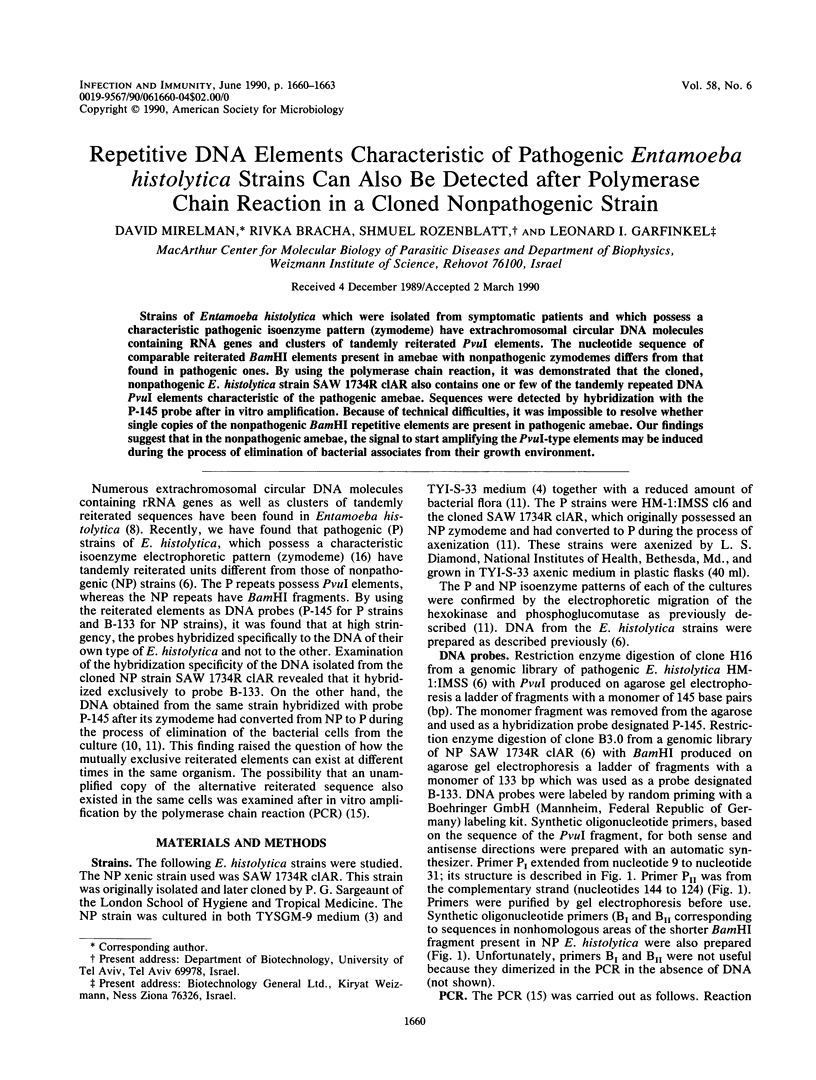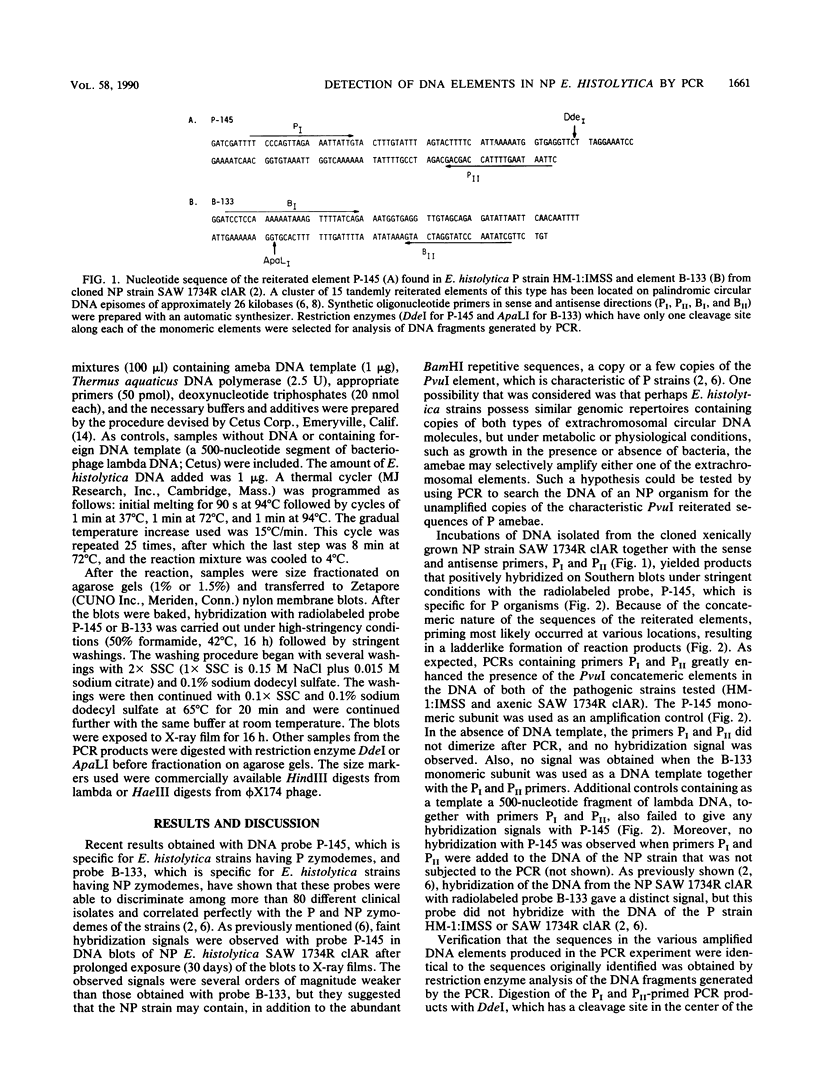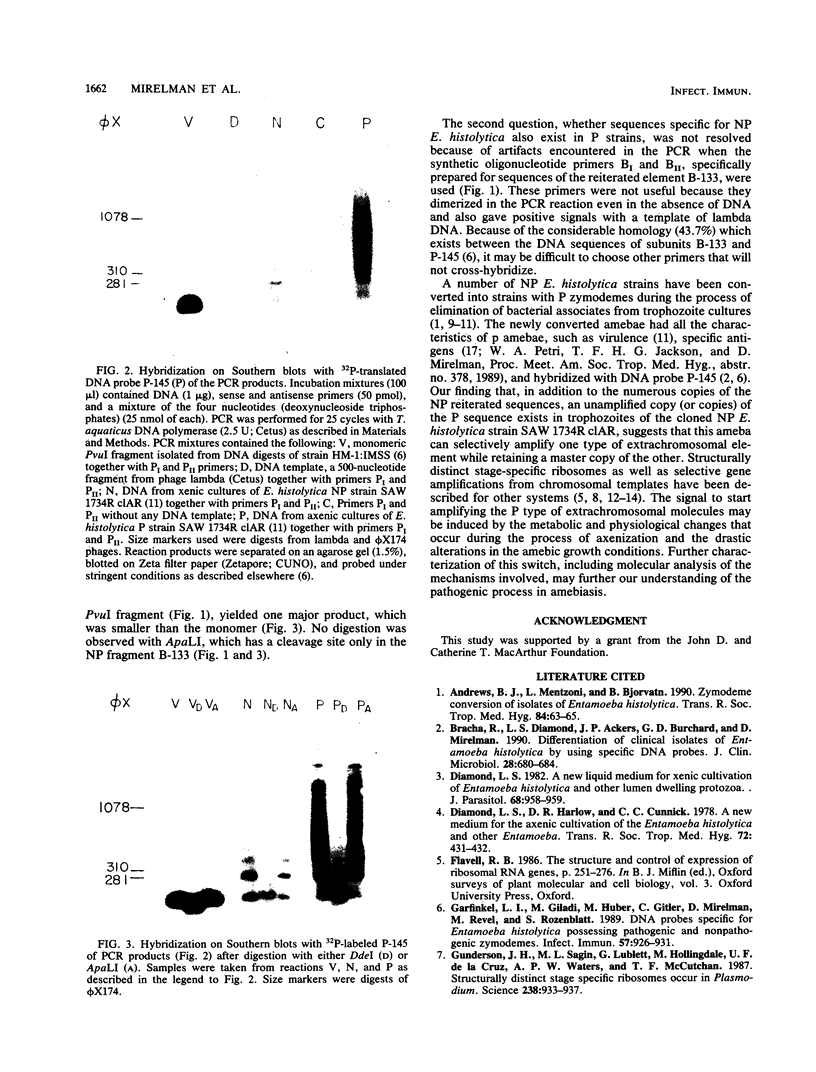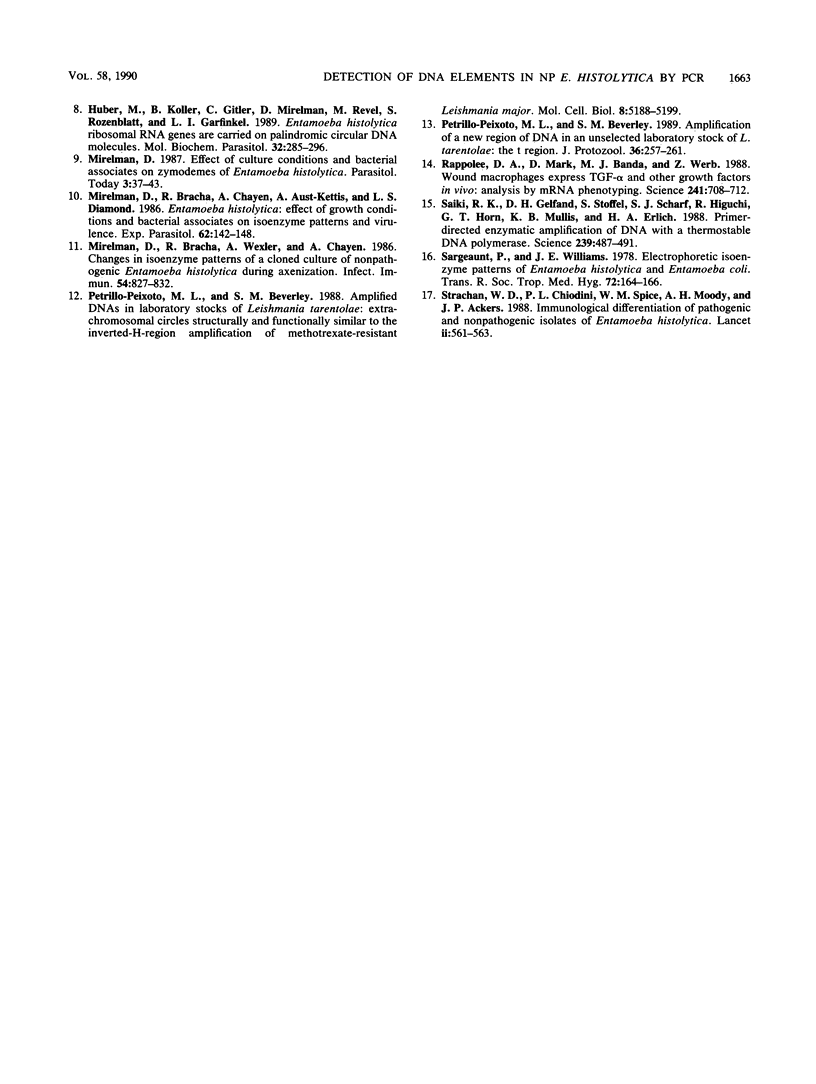Abstract
Strains of Entamoeba histolytica which were isolated from symptomatic patients and which possess a characteristic pathogenic isoenzyme pattern (zymodeme) have extrachromosomal circular DNA molecules containing RNA genes and clusters of tandemly reiterated PvuI elements. The nucleotide sequence of comparable reiterated BamHI elements present in amebae with nonpathogenic zymodemes differs from that found in pathogenic ones. By using the polymerase chain reaction, it was demonstrated that the cloned, nonpathogenic E. histolytica strain SAW 1734R clAR also contains one or few of the tandemly repeated DNA PvuI elements characteristic of the pathogenic amebae. Sequences were detected by hybridization with the P-145 probe after in vitro amplification. Because of technical difficulties, it was impossible to resolve whether single copies of the nonpathogenic BamHI repetitive elements are present in pathogenic amebae. Our findings suggest that in the nonpathogenic amebae, the signal to start amplifying the PvuI-type elements may be induced during the process of elimination of bacterial associates from their growth environment.
Full text
PDF



Images in this article
Selected References
These references are in PubMed. This may not be the complete list of references from this article.
- Andrews B. J., Mentzoni L., Bjorvatn B. Zymodeme conversion of isolates of Entamoeba histolytica. Trans R Soc Trop Med Hyg. 1990 Jan-Feb;84(1):63–65. doi: 10.1016/0035-9203(90)90385-r. [DOI] [PubMed] [Google Scholar]
- Bracha R., Diamond L. S., Ackers J. P., Burchard G. D., Mirelman D. Differentiation of clinical isolates of Entamoeba histolytica by using specific DNA probes. J Clin Microbiol. 1990 Apr;28(4):680–684. doi: 10.1128/jcm.28.4.680-684.1990. [DOI] [PMC free article] [PubMed] [Google Scholar]
- Diamond L. S. A new liquid medium for xenic cultivation of Entamoeba histolytica and other lumen-dwelling protozoa. J Parasitol. 1982 Oct;68(5):958–959. [PubMed] [Google Scholar]
- Diamond L. S., Harlow D. R., Cunnick C. C. A new medium for the axenic cultivation of Entamoeba histolytica and other Entamoeba. Trans R Soc Trop Med Hyg. 1978;72(4):431–432. doi: 10.1016/0035-9203(78)90144-x. [DOI] [PubMed] [Google Scholar]
- Garfinkel L. I., Giladi M., Huber M., Gitler C., Mirelman D., Revel M., Rozenblatt S. DNA probes specific for Entamoeba histolytica possessing pathogenic and nonpathogenic zymodemes. Infect Immun. 1989 Mar;57(3):926–931. doi: 10.1128/iai.57.3.926-931.1989. [DOI] [PMC free article] [PubMed] [Google Scholar]
- Gunderson J. H., Sogin M. L., Wollett G., Hollingdale M., de la Cruz V. F., Waters A. P., McCutchan T. F. Structurally distinct, stage-specific ribosomes occur in Plasmodium. Science. 1987 Nov 13;238(4829):933–937. doi: 10.1126/science.3672135. [DOI] [PubMed] [Google Scholar]
- Huber M., Koller B., Gitler C., Mirelman D., Revel M., Rozenblatt S., Garfinkel L. Entamoeba histolytica ribosomal RNA genes are carried on palindromic circular DNA molecules. Mol Biochem Parasitol. 1989 Jan 15;32(2-3):285–296. doi: 10.1016/0166-6851(89)90077-7. [DOI] [PubMed] [Google Scholar]
- Mirelman D., Bracha R., Chayen A., Aust-Kettis A., Diamond L. S. Entamoeba histolytica: effect of growth conditions and bacterial associates on isoenzyme patterns and virulence. Exp Parasitol. 1986 Aug;62(1):142–148. doi: 10.1016/0014-4894(86)90017-2. [DOI] [PubMed] [Google Scholar]
- Mirelman D., Bracha R., Wexler A., Chayen A. Changes in isoenzyme patterns of a cloned culture of nonpathogenic Entamoeba histolytica during axenization. Infect Immun. 1986 Dec;54(3):827–832. doi: 10.1128/iai.54.3.827-832.1986. [DOI] [PMC free article] [PubMed] [Google Scholar]
- Mirelman D. Effect of culture conditions and bacterial associates on the zymodemes of Entamoeba histolytica. Parasitol Today. 1987 Feb;3(2):37–37. doi: 10.1016/0169-4758(87)90210-9. [DOI] [PubMed] [Google Scholar]
- Petrillo-Peixoto M. L., Beverley S. M. Amplification of a new region of DNA in an unselected laboratory stock of L. tarentolae: the T region. J Protozool. 1989 May-Jun;36(3):257–261. doi: 10.1111/j.1550-7408.1989.tb05359.x. [DOI] [PubMed] [Google Scholar]
- Petrillo-Peixoto M. L., Beverley S. M. Amplified DNAs in laboratory stocks of Leishmania tarentolae: extrachromosomal circles structurally and functionally similar to the inverted-H-region amplification of methotrexate-resistant Leishmania major. Mol Cell Biol. 1988 Dec;8(12):5188–5199. doi: 10.1128/mcb.8.12.5188. [DOI] [PMC free article] [PubMed] [Google Scholar]
- Rappolee D. A., Mark D., Banda M. J., Werb Z. Wound macrophages express TGF-alpha and other growth factors in vivo: analysis by mRNA phenotyping. Science. 1988 Aug 5;241(4866):708–712. doi: 10.1126/science.3041594. [DOI] [PubMed] [Google Scholar]
- Saiki R. K., Gelfand D. H., Stoffel S., Scharf S. J., Higuchi R., Horn G. T., Mullis K. B., Erlich H. A. Primer-directed enzymatic amplification of DNA with a thermostable DNA polymerase. Science. 1988 Jan 29;239(4839):487–491. doi: 10.1126/science.2448875. [DOI] [PubMed] [Google Scholar]
- Sargeaunt P. G., Williams J. E. Electrophoretic isoenzyme patterns of Entamoeba histolytica and Entamoeba coli. Trans R Soc Trop Med Hyg. 1978;72(2):164–166. doi: 10.1016/0035-9203(78)90053-6. [DOI] [PubMed] [Google Scholar]
- Strachan W. D., Chiodini P. L., Spice W. M., Moody A. H., Ackers J. P. Immunological differentiation of pathogenic and non-pathogenic isolates of Entamoeba histolytica. Lancet. 1988 Mar 12;1(8585):561–563. doi: 10.1016/s0140-6736(88)91355-4. [DOI] [PubMed] [Google Scholar]




